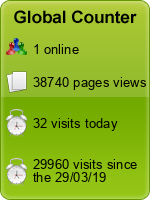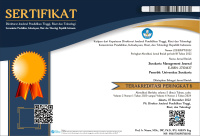PENGARUH PENGELOLAAN SEKTOR PUBLIK TERHADAP KINERJA DENGAN BERBAGAI FAKTOR MODERASI DI SATUAN KERJA PEMERINTAH DAERAH
Abstract
indicator, but it requires measurement of various collaborating indicators. After determining the
collaborative indicators, the implementation of PG is expected to increase. This research will use
various PG indicators such as openness and accountability, political stability and absence of violence,
government effectiveness, regulatory quality, rule of law, and corruption control in increasing PSP.
The implementation of PG on PSP is applied to Regional Government Work Units (SKPD) in Central
Java with the moderating variables being environmental dynamics and human resource skills as control
variables. Of the four PG elements have a positive effect on PSP, while the two variables of political
stability and absence of violence and quality of regulations have no effect on PSP. All indicators of
environmental dynamics moderation have a positive effect on PSP, while control of HR skills can be
used as their function.
Keywords
Full Text:
PDFReferences
Alatas, Vivi, Lant Pritchett dan Anna Wetterberg. 2002. Local Government Organizations,
Social Organizations, and the Quality of Local Governance. World Bank Policy
Research Working Paper 2981.
Andrew, 2013.OECD. African Studies Quarterly | Volume 13, Issue 4
Arnstein, Sherry R. 1969. A ladder of citizen participation. Journal of the American
Institute of Planners, Vol. 35, No. 4: hal. 216-224.
Banfield, Edward C. 1959. Ends and means in planning. International Social Science
Journal, Vol. 11, No. 3: Hal. 361-368.
Begozzi, R. P., & Yi, Y. 1988. On the evaluation of structural equation models. Journal of
the Academy of Marketing Science, 16(1), 74–94.
Benviste, Guy. 1972. The politics of expertise. Glendessary Press, Berkeley, Calif.
Bingle, BenjaminS. 2013. Nonprofit And Public Sector Human Resources Management:A
Comparative Analysis. International Journal of Management & Information Systems,
(3).
Bluestone, Barry; dan Bennet Harrison. 1982. The deindustrialization of America. Basic
Books, New York.
Brakertz, Nicola dan Russel Kenley. 2002. A service delevery approach to measuring
facility performance in local government, Vol. 20 No.3 / 4. Hal. 127-135.
Branch, Melville C. 1983. Comprehensive planning: General theory and principles.
Bryson, John M.; Andrew H. Van de Ven, dan William D. Roering. 1986. Strategic
planning and the revitalization of the public service,
Bregn, Kirsten. 2013. Detrimental Effects of Performance-Related Pay in the Public
Sector? On the Need for a Broader Theoretical Perspective. Public Organization
Review . 13:21–35
Bovaird, Tony. 2007. Beyond Engagement and Participation: User and Community
Coproduction of Public Services. Public Administration Review; 67(5): 846
Bunse Simone dan Verena Fritz. 2012. Making Public Sector Reforms Work Political and
Economic Contexts, Incentives, and Strategies. The World Bank Poverty Reduction
and Economic Management Network Public Sector Governance Unit
Carranza Angel Saz- dan Francisco Longo. 2012. Managing CompetingInstitutional
Logics in Public–Private Joint Ventures Routledge Informa Ltd Registered in
England and Wales
Clavel, Pierre. 1983. Opposition planning in Wales and Appalachia. Temple University
Press, Philadelphia.
Coyle, Barbara McCabe dan Jill Tao. 2006. Private Governments and Private Services:
Homeowners Associations in the City and Behind the Gate. Review of Policy
Research, Volume 23, Number 6
Cooper, D.R., & Emory, C.W. (1995). Business Research Methods. Fitth Edition. Chicago:
Richard D. Irwin Inc.
Cooper, D. R., & Schlindler, P. S. Donald R.Cooper & Pamela S.Schindler, 2006, Bussines
Research Methods. , 9th ed. McGraw. Hill International Edition
Curristine , Teresa., Zsuzsanna Lonti and Isabelle Joumard. 2007. OECD Improving
Public Sector Efflciency: Challenges and Opportunities. OECD Journal on Budgeting
Volume 7 - No, 1
Curtis, Donald . 1999. Performance management for participatory democracy: thoughts
on the transformation process in South African local government. International
Journal of Public Sector Management, Vol. 12 No. 3, 1999, pp. 260-272.
David Straus, Thomas C. Layton, 2002 How to Make Collaboration Work: Powerful Ways
to Build Consensus, Solve Problems, and Make Decisions Berrett-Koehler
Publishers
Davidoff, Paul. 1965. Advocacy and pluralism in planning . Journal of the American
Institute of Planners, Vol. 31, No. 4: hal. 331-338.
Davos, C. A. 1998. Sustaining co-operation for coastal sustainability. Journal of
Environmental Management 52 (4):379-387.
Denhardt, Robert B. 1985. Strategic planning in state and local government . State and
Local Government Review, Vol. 17, No. 1: hal. 174-179.
Dijkstra, T. K., & Henseler, J.2015. Consistent and asymptotically normal PLS estimators
for linear structural equations. Computational Statistics & Data Analysis, 81, 10–23.
doi:10.1016/j.csda.2014.07.008
Dwivedi, Yogesh K, Vishanth Weerakkody dan Marijn Janssen. 2011. Moving Towards
Maturity: Challenges to Successful E-government Implementation and Diffusion.
The DATA BASE for Advances in Information Systems 42 (4).
Edwards, Meredith dan Bryan Horrigan., Geoffrey Nicoll 2012. Public Sector Governance
in Australia. Co-published with ANZSOG
Frederickson, H. G. 1997. The spirit of public administration. San Francisco, CA: JosseyBass.
Garrison. 2000 Blurring Boundaries: The Integration of NGOs into Governance in Kenya.
International Public Management Journal, 13(4), pages 551–568
Ghozali, I. 2013. Aplikasi Analisis Multivariat dengan Program SPSS. Semarang: Badan
Penerbit Universitas Diponegoro.
Goodman, Robert. 1971. After the planners. Simon & Schuster, New York.
Greg Wilkinson and Elaine Monkhouse. 1994. Strategic Planning in Public Sector
Organizations. Executive Development, Vol. 7 No. 6
Gavieta, Rommel C. 2006. How Contract Rights and Public Sector Governance Affect
Infrastructure Invesment: The Philippine Experience. Journal of Structured Finance;
(1).
Gujarati, Damodar N., 2004. Basic Econometrics. Fourth Edition. New York: McGrawHill, Inc
Hartono, J. (2010). Metodologi penelitian bisnis: Salah kaprah dan pengalamanpengalaman. Yogyakarta: BPFE UGM.
Halachmi, Arie. 2011, Imagined promises versus real challenges to public performance
management. International Journal of Productivity and Performance Management.
Vol. 60 No. 1, pp. 24-40
Hair, J. F., Hult, G. T. M., Ringle, C. M., & Sarstedt, M. 2013. A Primer on Partial Least
Squares Structural Equation Modeling (PLS-SEM). Thousand Oaks: Sage.
Hair, J. F, Black., W.C,Babin., B. J, AndersonR.E., &Tatham R. L.,2006. Multivariate
Data Analisys.Sixth Edition. New Jersey: Prentice Hall.
Harsono, Mugi, 2002. Prosedur Pengujian Variabel Kontrol dan Moderator dalam
penelitian perilaku dengan menggunakan SPSS 10.00. Seminar Bulanan Jurusan
Manajemen Fakultas Ekonomi Universitas Sebelas Maret.
He, Rong dan Gao, Qian. 2007. Strategic Trade Policy In China's Suitable Condition
Analysis. Foreign Trade Practice, Vol. 8.
Henseler, Jörg, Geoffrey Hubona dan Pauline Ash Ray, 2016. Using PLS path modeling in
new technology research: updated guidelines. Industrial Management & Data
Systems Emerald Group Publishing Limited. Vol. 116 No. 1, pp. 2-20.
Henseler, J., Dijkstra, T. K., Sarstedt, M., Ringle, C. M., Diamantopoulos, A., Straub, D.
W., … Calantone, R. J. 2014. Common Beliefs and Reality About PLS: Comments
on Ronkko and Evermann (2013). Organizational Research Methods, 17(2), 182–
doi:10.1177/1094428114526928
Henseler, J., Hubona, G., & Ray, P. A.2016. Using PLS path modeling in new technology
research: updated guidelines. Industrial Management & Data Systems, 116(1), 2–20.
doi:10.1108/IMDS-09-2015-0382
Hill, Caroly J dan Laurence E. Lynn Jr. 2004. Governance and public management an
intorduction. Jurnal policy analysis an management. Vol. 23. No. 1. Pp. 3-11.
Hood, Christoper. 2008. Option for Britian: Measuring and Managing Public Services
Performance. The Political Quarterly Publishing. Blackwell Publishing Ltd. USA
Huitema, D., E. Mostert, W. Egas, S. Moellenkamp, C. Pahl-Wostl, and R. Yalcin. 2009.
Adaptive water governance: assessing the institutional prescriptions of adaptive (co-
) management from a governance perspective and defining a research agenda.
Published here under license by the Resilience Alliance.
IMF, 2005, The IMF's Approach to Promoting Good Governance and Combating
Corruption —A Guide, International Monetary Fund. 20 June.( http://www.imf.org)
Ivana Burcar Dunović, 2010. A study of project governance frameworks for large
infrastructure projects with reflection on road transport projects. organization,
technology and management in construction. an international journal
Janine O’Flynn ; John Wanna.. 2008. Collaborative governance : a new era of public policy
in Australia? National Library of Australia. This edition ANU E Press
Jenkins, W. I. 1978. Policy analysis. New York: St. Martin's Press.
Jeremy L. Hall. 2012. Public Performance & Management Review, Vol. 35, No. 3, March,
pp. 485–488.
Kaufmann, Daniel., Aart Kraay. 2008.Governance Indicators: Where Are We,Where
Should We Be Going?. Oxford University Press on behalf of the International Bank
for Reconstruction and Development -
Kaufmann D., Kraay A., Mastruzzi M. 2009. Aggregate and Individual Governance
Indicators 1996–2008. The World Bank Development Research Group
Macroeconomics and Growth Team.
KNKG. 2010. Pedoman Umum Good Public Governance. Komite Nasional Kebijakan
Governace Indonesia
Musgrave, R. 1997, "Devolution, Grants and Fiscal Competition", Journal economic
Perspectives 11.(4), 65-72
DOI: http://dx.doi.org/10.52429/smj.v2i2.413
Refbacks
- There are currently no refbacks.

This work is licensed under a Creative Commons Attribution-NonCommercial 4.0 International License.






